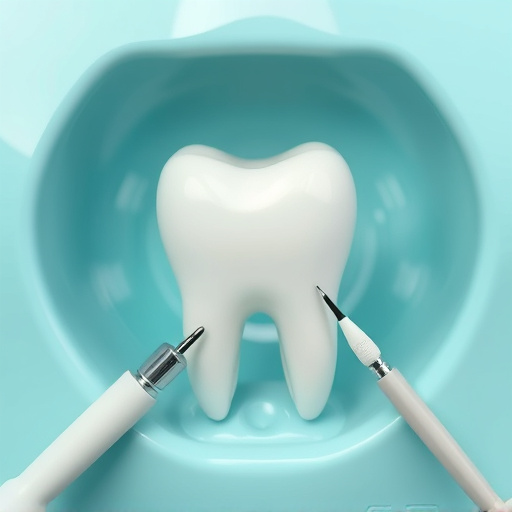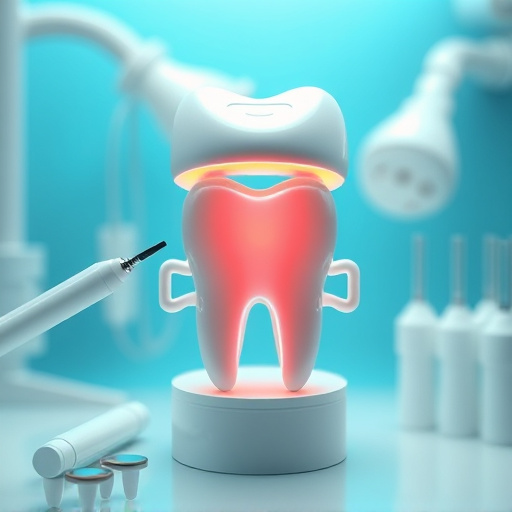Scaling and root planing are critical dental procedures for removing plaque and tartar buildup above and below the gumline, preventing gum disease progression, and preserving tooth and gum integrity. Recommended by family dentistry professionals, these non-invasive processes involve comprehensive examination, local anesthesia, ultrasonic scaling tools, and root planing instruments to promote optimal oral health. Regular follow-up care with effective brushing, flossing, mouthwash, clear aligners, and dental bonding supports long-term oral health and aesthetics.
Scaling and root planing are essential procedures for maintaining long-term oral health. This deep cleaning process targets plaque and tartar buildup, even below the gumline, where typical brushing and flossing may fall short. By understanding the benefits and undergoing this routine care, individuals can significantly reduce the risk of gingivitis, periodontitis, and other dental complications. This article explores the advantages, steps involved, and post-treatment care for optimal oral health through scaling and root planing.
- Understanding Scaling and Root Planing Benefits
- The Process of Deep Cleaning for Teeth and Gums
- Maintaining Oral Health After Scaling and Root Planing
Understanding Scaling and Root Planing Benefits

Scaling and root planing are essential dental procedures that offer significant long-term oral health benefits. These processes involve thoroughly cleaning and smoothing the surfaces of teeth and tooth roots, removing built-up plaque and tartar that can’t be eliminated through regular brushing and flossing. By addressing these deposits, scaling and root planing help to prevent gum disease progression, reduce inflammation, and promote overall dental health.
Moreover, this procedure is crucial for maintaining the integrity of teeth and gums, particularly in areas where wisdom teeth removal or the placement of dental implants might be necessary. Regular maintenance through scaling and root planing can preserve the periodontal pocket depth, making it easier to manage oral care around these complex dental procedures. It’s a proactive approach that family dentistry professionals recommend to ensure patients enjoy optimal oral health for years to come.
The Process of Deep Cleaning for Teeth and Gums

Deep cleaning for teeth and gums involves a comprehensive process known as scaling and root planing. This non-invasive procedure is designed to remove stubborn plaque and tartar buildup, both above and below the gumline. Scaling uses specialized instruments to gently scrape away this deposit, while root planing smooths the tooth roots, eliminating any rough spots that can harbor bacteria.
The process begins with a thorough examination to determine the extent of calculus accumulation. Dentists then use local anesthesia to numb the area for patient comfort. Next, an ultrasonic scaling tool is employed to remove plaque and tartar from the surfaces of teeth and along the gumline. Finally, root planing instruments meticulously smooth the roots, promoting healthy gums and preventing future issues like gingivitis or periodontitis. This deep cleaning approach is a cornerstone of preventative restorative dentistry and can also be an effective solution for those in need of emergency dental care.
Maintaining Oral Health After Scaling and Root Planing

After successful scaling and root planing procedures, maintaining optimal oral health is paramount to prevent future issues. This includes adhering to a thorough oral care routine that combines effective brushing, flossing, and mouthwash use. Regular dental check-ups, often involving routine oral exams, are crucial for monitoring any changes in the gums and teeth, ensuring early detection of potential problems.
Complementing these practices, clear aligners or dental bonding can play a supporting role in maintaining a healthy smile. Clear aligners, for instance, offer a discreet way to straighten teeth while minimizing the need for frequent touch-ups compared to traditional braces. Dental bonding, on the other hand, can help repair chipped or cracked teeth, enhancing overall oral aesthetics and functionality.
Scaling and root planing are effective, long-term solutions for maintaining optimal oral health. By removing plaque and tartar buildup, these procedures promote healthier gums and stronger teeth. Following your treatment, consistent oral care routines, including regular brushing and flossing, are key to preventing future issues. Remember, proactive dental care is essential for a vibrant, healthy smile.














